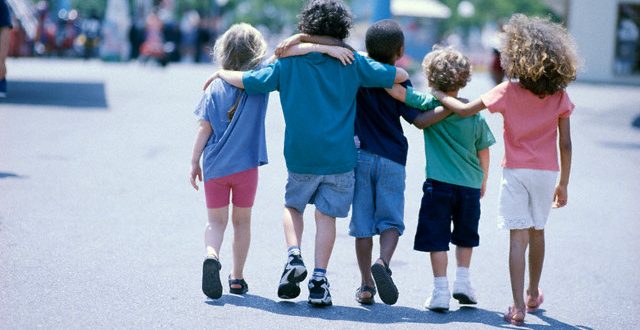By Tim Hayes
I can’t even begin to imagine the courage required.
Picture this. A Catholic elementary school, grades one through eight. About 400 students in all. And every single one of them white. Sure, they broke out by family heritage, the Germans outnumbered everyone else, but you had Italian, Irish, Polish. Most of Western Europe well represented, but all white.
And you’re the only black student. The. Only. Black. Student. Plus, you’re not even Catholic.
Yet, driven by your parents’ belief in a quality education, they send you off to that school, alone. I can only guess at the fear, anxiety, concern – of that young girl, certainly, but also of her mother and father.
But there she was. Tracy. There on the first day of seventh grade, in my homeroom. Taking her seat amid stares and whispers. Shock and surprise. Curiosity and questions.
This wasn’t to say that prejudice did not exist among my classmates. I’m sure it did. In some more than others. I don’t mean to excuse some of the faculty, either. This introduced all of us to some very new territory, and it took some time to get acclimated.
Tracy, as I recall, did her best, participating in class, being friendly to her classmates – mostly the other girls – and trying hard to not stand out or stand apart. She wanted to be a member of our seventh-grade class, the same as anyone else. Not the “black girl” of the seventh-grade class. She didn’t want to be a novelty, an exception, a distraction.
At the same time, though, we’re talking about the seventh grade. Kids in seventh grade can be an unpredictable, ridiculous, reprehensible bunch on their best days. The first whispers of hormones get carried on the breeze. Girls become gossipy, clique-obsessed, moody. Boys get shot full of bravado and testosterone, with no clue as to how to recognize or control it.
Seventh grade can be a full-blown shitstorm, let’s face it. Introduce a new student like Tracy, in the early ‘70s when society may have been, shall we say, even less enlightened? Well, as I said, I can’t believe the courage required on her part.
Around Valentine’s Day, one of the girls in our class said she would be hosting a party at her house, and that we all could come. Hallway and playground chatter for the next week dealt with little other than who was going, what would it be like, would anybody chicken out at the last minute? Even though this all happened in the dark ages before text messages, Twitter, and all the rest, we had our own crude, rudimentary social media going like a house afire.
At last the big evening arrived. My neighbor’s Dad drove me and his daughter to the party (she was my longtime friend, not a girlfriend), and said he’d be back around 10 p.m. We went in to the house, then down to the basement, where the streamers and refreshments had been set up. Other kids trickled in for the next half-hour or so, including Tracy.
At this point, the only boys present were me and two other guys from class. We sat on one side of the basement, keeping to ourselves, while the girls stood around and talked on the other side.
Soon, shouts could be heard near the basement windows at street level. Hands started slapping against the windowpanes. Faces soon pressed against the glass, laughing and yelling. Other male classmates were trying to disrupt the party inside by provoking trouble. But what was worse, they said they wouldn’t come in until somebody left. It didn’t take much to understand who they meant.
And most of these ignoramuses were altar boys.
Well, I’m proud to say that no one left the party. For my part, it wasn’t necessarily because I had suddenly turned into a fearless advocate for racial justice and harmony. I mean, I knew those guys outside were way out of line, and I had come to like Tracy as a classmate. But the bigger reasons I stayed were that my ride home wouldn’t get there for another two hours, and I didn’t want to get beat up.
That night has stayed with me for more than 40 years, though. How easy it is to hate. To frighten. To convince oneself of the righteousness of a cause and to feel brave while part of a pack gathered under the cloak of darkness. And how hard it is to withstand such needless, warrantless, heartless, pointless abuse.
Tracy stayed at the party that Friday night, and she took her seat again the following Monday morning in class. If any of that nonsense got to her, she never let it show.
As we all have been so viciously reminded over the past few weeks, however, even in 2020 the regretful stain of America’s original sin – racism – rears up in ferocious fashion, still. Trapped in a streamer-trimmed basement in 1973, I got my first taste of what it must be like for people of color all the time. It sucked then and has only become more repugnant over the years.
I have no idea whatever happened to Tracy, once we all left for high school. My hope is that she’s a happy, content, successful wife, mother, businesswoman, entrepreneur, friend – enjoying a life free from ignorance and intimidation. If not, then it’s on me, you, all of us to do more than empathize. We need to act, to change our lives to improve the lives of our fellow travelers on this earth.
To enable everyone to live a life like the one Tracy demonstrated to us in the seventh grade. A life of dignity. A life of honor. A life of courage.
Copyright 2020 Timothy P. Hayes


No Comments Yet